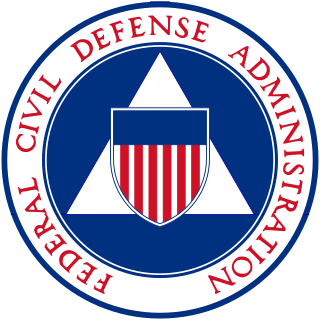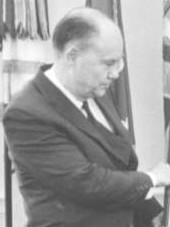
Camp David is the 125-acre country retreat for the president of the United States of America. It is located in the wooded hills of Catoctin Mountain Park, in Frederick County, Maryland, near the towns of Thurmont and Emmitsburg, about 62 miles (100 km) north-northwest of the national capital city of Washington, D.C. It is officially known as the Naval Support Facility Thurmont. Because it is technically a military installation, the staffing is primarily provided by the Seabees, Civil Engineer Corps (CEC), the United States Navy and the United States Marine Corps. Naval construction battalions are tasked with base construction and send detachments as needed.

David Dwight Eisenhower was an American military officer and statesman who served as the 34th president of the United States from 1953 to 1961. During World War II, he served as Supreme Commander of the Allied Expeditionary Force in Europe, and achieved the five-star rank of General of the Army. He planned and supervised the invasion of North Africa in Operation Torch in 1942–1943 and the invasion of Normandy (D-Day) from the Western Front in 1944–1945.
The Presidential Medal of Freedom is an award bestowed by the president of the United States to recognize people who have made "an especially meritorious contribution to the security or national interests of the United States, world peace, cultural or other significant public or private endeavors." The Presidential Medal of Freedom and the Congressional Gold Medal are the highest civilian awards of the United States. The award is not limited to U.S. citizens and, while it is a civilian award, it can also be awarded to military personnel and worn on the uniform. It was established in 1963 by President John F. Kennedy, superseding the Medal of Freedom that was established by President Harry S. Truman in 1945 to honor civilian service during World War II.

The United States secretary of defense (SecDef) is the head of the United States Department of Defense, the executive department of the U.S. Armed Forces, and is a high ranking member of the federal cabinet. The secretary of defense's position of command and authority over the military is second only to that of the president of the United States, who is the commander-in-chief. This position corresponds to what is generally known as a defense minister in many other countries. The secretary of defense is appointed by the president with the advice and consent of the Senate, and is by custom a member of the Cabinet and by law a member of the National Security Council.

The Combined Federal Campaign (CFC) is the workplace giving program of the federal government of the United States. The program is authorized by executive order 12353 of March 23, 1982, and is overseen by the United States Office of Personnel Management (OPM). Issued by President Reagan, the order states that a CFC objective is "to lessen the burdens of government and of local communities in meeting needs of human health and welfare ..." According to OPM's website, the mission of the CFC "is to promote and support philanthropy through a program that is employee focused, cost-efficient, and effective in providing all federal employees the opportunity to improve the quality of life for all".

The Federal Civil Defense Administration (FCDA) was organized by President Harry S. Truman on December 1, 1950, through Executive Order 10186, and became an official government agency via the Federal Civil Defense Act of 1950 on 12 January 1951. In 1958 the FCDA was superseded by the Office of Civil and Defense Mobilization when President Dwight D. Eisenhower merged the FCDA with the Office of Defense Mobilization.

In political studies, surveys have been conducted in order to construct historical rankings of the success of the presidents of the United States. Ranking systems are usually based on surveys of academic historians and political scientists or popular opinion. The scholarly rankings focus on presidential achievements, leadership qualities, failures and faults. Popular-opinion polls typically focus on recent or well-known presidents.

Executive Order 11246, signed by President Lyndon B. Johnson on September 24, 1965, established requirements for non-discriminatory practices in hiring and employment on the part of U.S. government contractors. It "prohibits federal contractors and federally assisted construction contractors and subcontractors, who do over $10,000 in Government business in one year from discriminating in employment decisions on the basis of race, color, religion, sex, or national origin." It also requires contractors to "take affirmative action to ensure that applicants are employed, and that employees are treated during employment, without regard to their race, color, religion, sex or national origin." The phrase affirmative action had appeared previously in Executive Order 10925 in 1961.
The Distinguished Civilian Service Awards Board was a board created for recommending civilians for awards from the U.S. Federal government for distinguished service. It was originally established by President Dwight D. Eisenhower on June 27, 1957 by Executive Order 10717 to recommend to the President people in the U.S. Civil Service to receive the President's Award for Distinguished Federal Civilian Service. Its mandate was expanded via Executive Order 11085 by President John F. Kennedy on February 22, 1963, so that the board would recommend to the President people to be awarded the Presidential Medal of Freedom.

John Williams Macy Jr. was a United States Government administrator and civil servant.

Andrew Jackson Goodpaster was an American Army General. He served as NATO's Supreme Allied Commander, Europe (SACEUR), from July 1, 1969, and Commander in Chief of the United States European Command (CINCEUR) from May 5, 1969, until his retirement December 17, 1974. As such, he was the commander of all NATO (SACEUR) and United States (CINCEUR) military forces stationed in Europe and the surrounding regions.

The Civil Service Reform Act of 1978, (CSRA), reformed the civil service of the United States federal government, partly in response to the Watergate scandal. The Act abolished the U.S. Civil Service Commission and distributed its functions primarily among three new agencies: the Office of Personnel Management (OPM), the Merit Systems Protection Board (MSPB), and the Federal Labor Relations Authority (FLRA).

Executive Order 13087 was signed by U.S. President Bill Clinton on May 28, 1998, amending Executive Order 11478 to prohibit discrimination based on sexual orientation in the competitive service of the federal civilian workforce. The order also applies to employees of the government of the District of Columbia, and the United States Postal Service. However, it does not apply to positions and agencies in the excepted service, such as the Central Intelligence Agency, National Security Agency, and the Federal Bureau of Investigation.
Executive Order No. 10479 is a directive by President Dwight Eisenhower that created the Government Contract Committee. Issued on August 13, 1953, the order sought to insure compliance with, and successful execution of, the equal employment opportunity program. Therefore, the United States Government enacted laws to guarantee equal employment opportunity to all employees, so that they receive fair and equitable treatment. The order directs that all qualified candidates seeking employment on government contracts or subcontracts will not be discriminated against due to their race, creed, color, or national origin.
President Dwight D. Eisenhower issued Executive Order 10450 on April 27, 1953. Effective May 27, 1953, it revoked President Truman's Executive Order 9835 of 1947, and dismantled its Loyalty Review Board program. Instead it charged the heads of federal agencies and the Civil Service Commission, supported by the Federal Bureau of Investigation (FBI), with investigating federal employees to determine whether they posed security risks. It expanded the definitions and conditions used to make such determinations. The order contributed to the ongoing Lavender scare of the mid-1950s, barring thousands of lesbian and gay applicants from government jobs.

Frederick Joseph Lawton was an American bureaucrat who served as the ninth Director of the Bureau of the Budget. Lawton was born in Washington, D.C., and became a lawyer and an accountant. He spent most of his professional career working with the government bureaucracy. He helped President Franklin D. Roosevelt wager with members of Congress to support the Fair Labor Standards Act. He first joined the Office of Management and Budget as an executive assistant in 1935. He also served as an adviser to Congress. In 1947, he became an administrative assistant to President Harry S. Truman. He was appointed to the post of Director of the Bureau of the Budget in 1950, and held the position until 1953. President Dwight D. Eisenhower appointed Lawton to a term on the United States Civil Service Commission after he left the Bureau; he served from 1953 to 1963.

Roger W. Jones was a United States government official that served seven United States Presidents in various capacities, including Deputy Secretary of State under President John F. Kennedy. During his 43 years of service in the United States federal government, he also served as deputy director of the Office of Management and Budget and Chairman of the Civil Service Commission, and was awarded the President's Award for Distinguished Federal Civilian Service and the National Civil Service Reform League Award.

The following is a timeline of the presidency of Jimmy Carter, from January 1, 1980, to January 20, 1981.

William J. Hopkins was an American civil servant. He served as the Executive Clerk of the White House from 1948 to 1971. In total, he served 40 years at the White House working for seven presidents.
















